How Can Academic Researchers Synthesize Literature Reviews in Minutes with AI?
It's 2 AM. Your desk holds 40 research papers that must become a complete literature review by morning. You've been reading for hours, trying to connect ideas between different studies. Your eyes hurt, and you still don't understand how these papers relate to each other.
This situation affects most researchers. They spend countless hours reading and organizing papers manually instead of focusing on actual research work.
Studies show researchers spend 60% of their time just reading and organizing papers. The average literature review takes three to four weeks to complete. Researchers often miss important connections between studies during this process.
The Main Problems with Traditional Literature Reviews

Creating literature reviews the traditional way creates multiple challenges that slow down research progress.
Time Management Issues:
- Reading every paper completely, even when only small sections matter
- Remembering key points from dozens of different studies
- Tracking connections between papers manually
- Starting over when adding new papers to existing reviews
Organization Problems:
- Managing stacks of printed papers with different colored highlights
- Losing track of which paper contained which information
- Missing important patterns that span multiple studies
- Forgetting paper content and needing to re-read documents
The most frustrating part happens when you're almost finished. You realize you need more papers for your review. This means checking how new papers fit with your existing work. Often, this requires starting the entire process again.
Traditional methods also make it hard to see the big picture. You get lost in details from individual papers. You miss the broader themes and connections that make literature reviews valuable.
How AI Changes Literature Review Work

AI changes how researchers handle large collections of academic papers. Instead of reading every document word by word, you can ask direct questions about your entire paper collection.
Elephas serves as an AI assistant that works on Mac, iPhone, and iPad devices. It helps you build a personal knowledge base for storing research papers. You can then ask questions about these papers and get quick answers.
Key Privacy Benefits:
- All data stays on your device
- Research remains completely private
- No information sent to external servers
- Full control over sensitive academic content
The system understands academic language and can identify key concepts across multiple papers simultaneously. This approach shifts your focus from information management to actual analysis and insight generation.
Step-by-Step Process for AI-Powered Literature Reviews
Actually, using AI tools for literature reviews is easier than you think. Here is a step-by-step process you can use for easy implementation and usage of AI tools.
Step 1: Create Your Research Knowledge Base
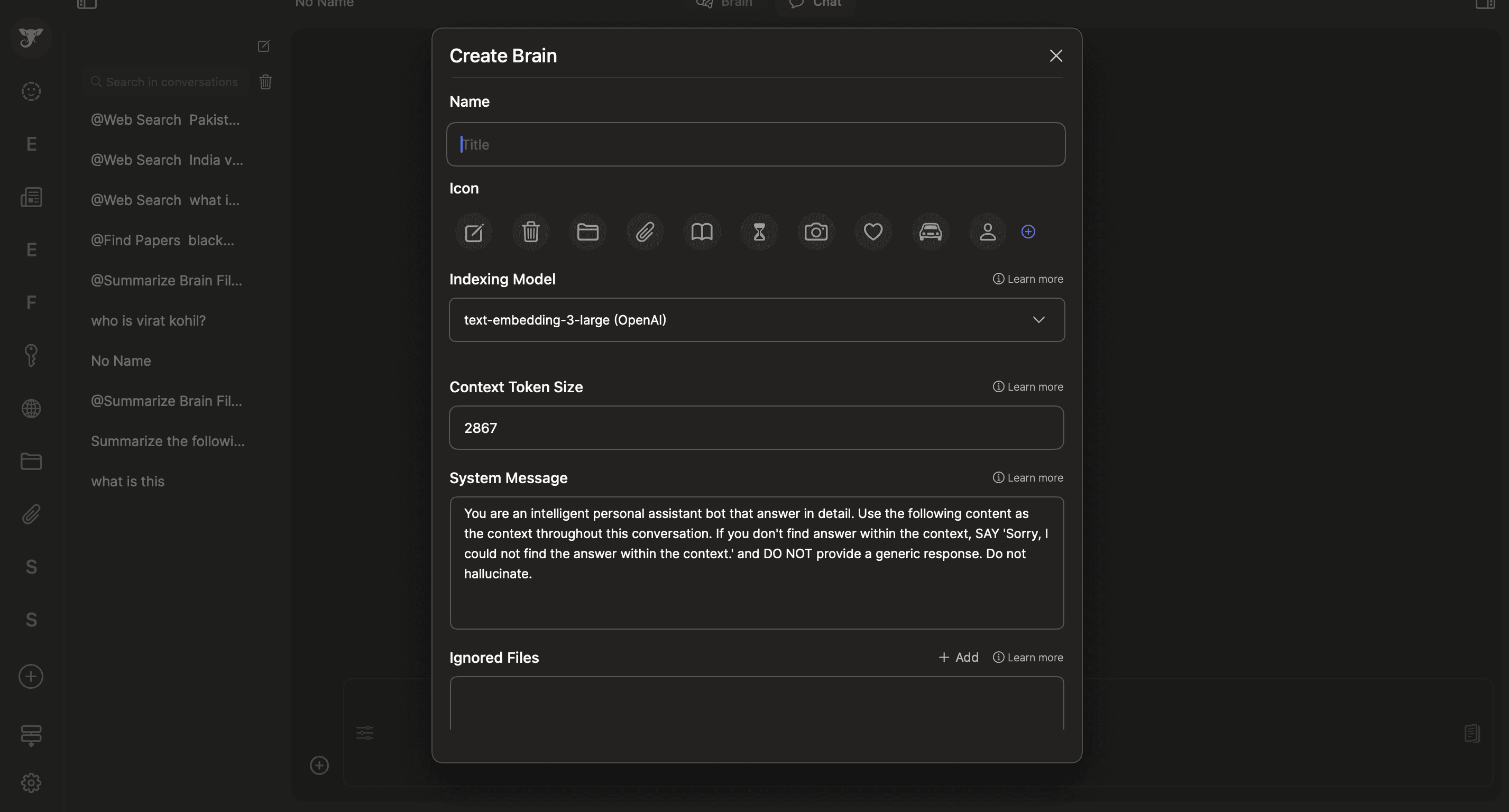
Start by creating a new "Brain" in Elephas for your literature review project. Think of this as an intelligent folder that understands and analyzes academic content.
Setup Process:
- Choose a clear name for your project
- Select relevant subject areas
- Configure analysis preferences
- Prepare the system for academic content
The setup takes only a few minutes. You complete this process once per research project. The system prepares itself to understand academic papers and research terminology specific to your field.
Step 2: Upload Your Research Papers
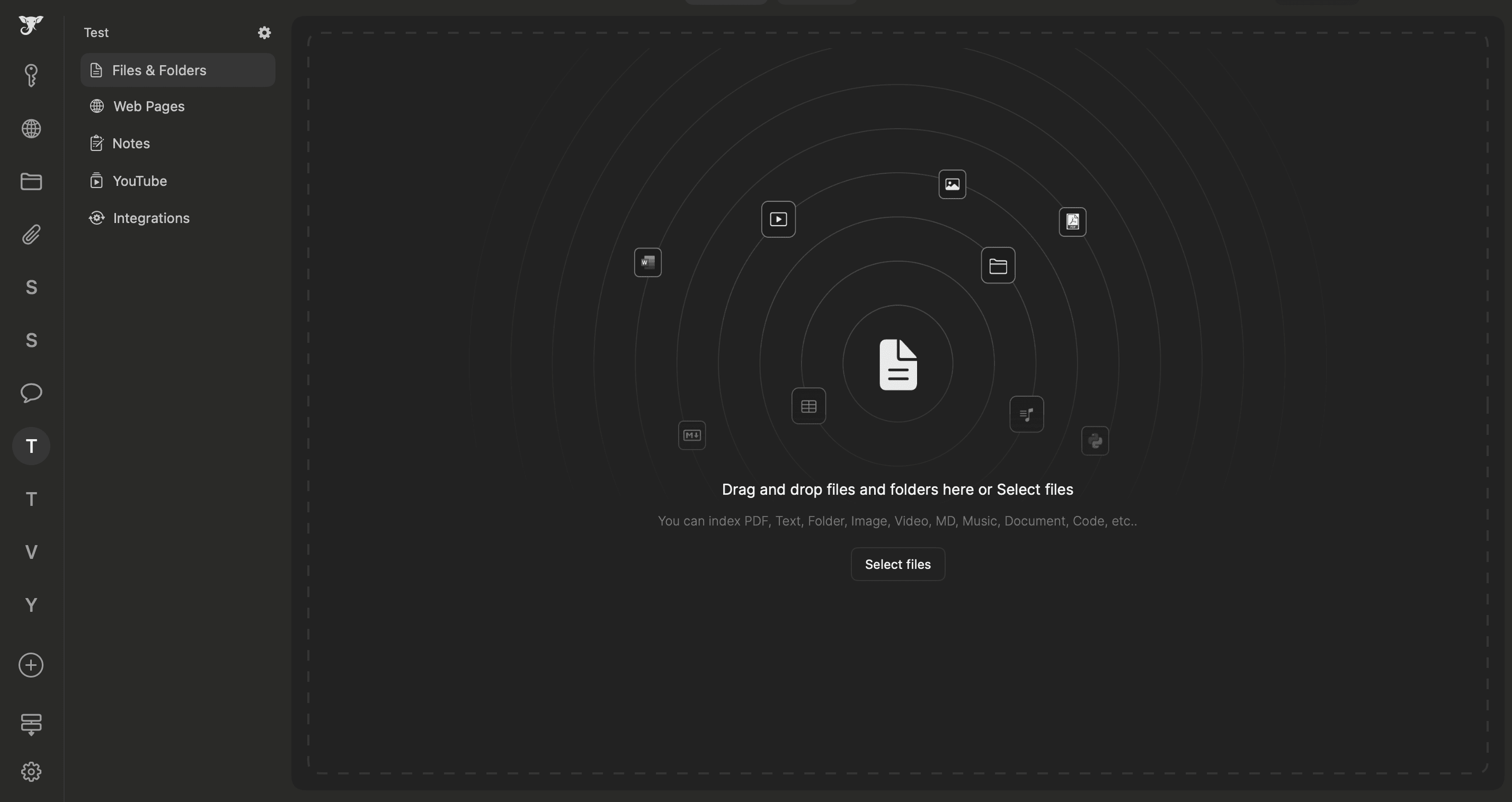
Add all relevant research papers to your newly created Brain. The system accepts multiple file formats and can process many documents simultaneously.
Supported File Types:
- PDF documents (most common academic format)
- Word documents and text files
- Research notes and annotations
- Conference papers and presentations
Upload Benefits:
- Drag and drop multiple papers at once
- Add new papers as you discover them
- Automatic content indexing and organization
- Local processing ensures data privacy
Elephas reads through uploaded papers and creates a searchable index of all content. This happens automatically without requiring your attention. The system identifies key concepts, research methods, and findings across your entire paper collection.
Step 3: Ask Strategic Questions
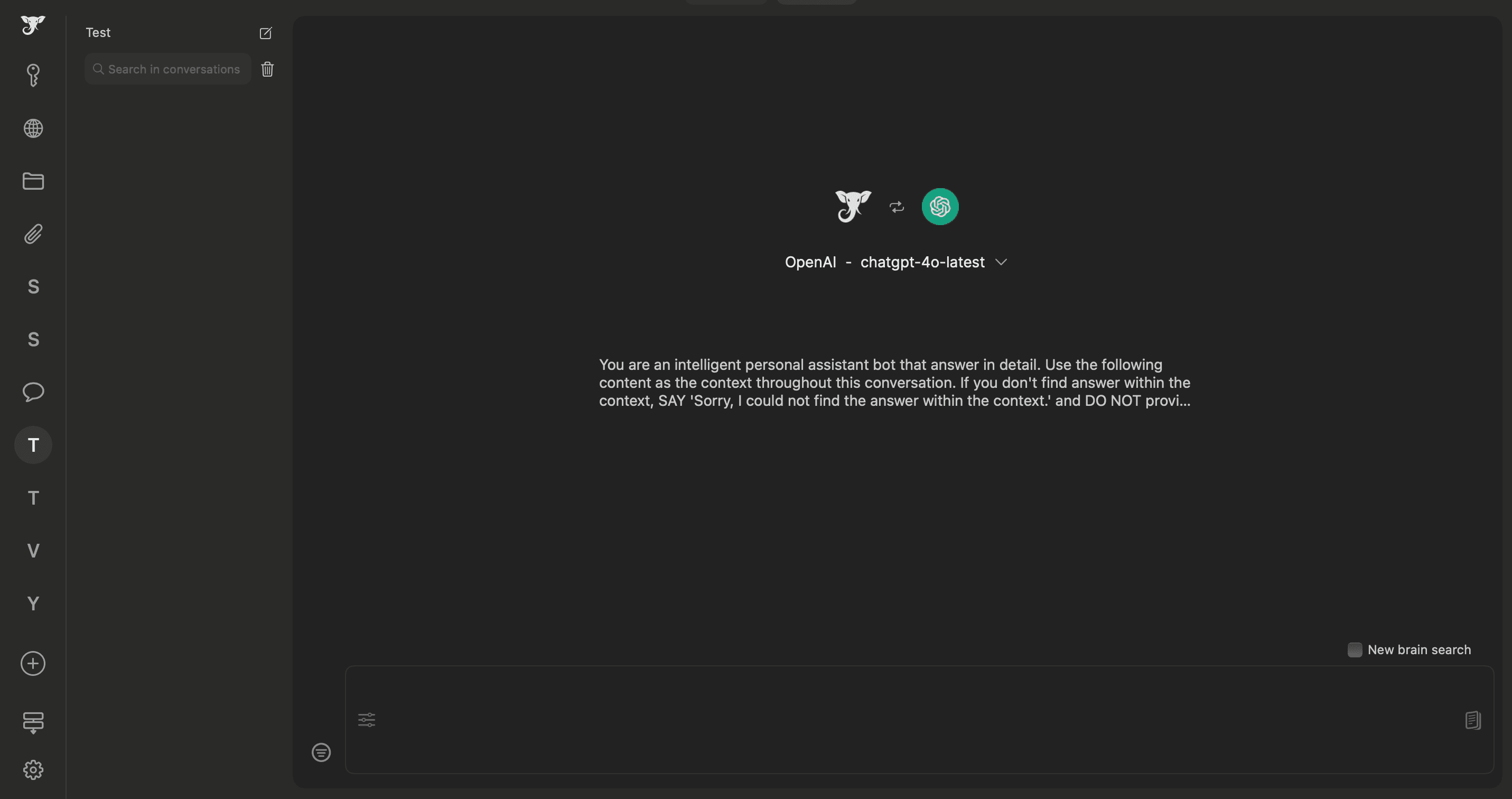
This step transforms how you interact with research literature. Instead of reading every paper individually, you ask specific questions about your entire collection.
Effective Question Types:
- "What are the main themes across these studies?"
- "Which papers use similar research methods?"
- "How do these studies disagree with each other?"
- "What research gaps exist in this field?"
- "Which papers were published in recent years?"
Question Strategy:
- Start with broad questions to understand the research landscape
- Ask specific questions about methods and findings
- Identify contradictions and debates in the field
- Explore connections between different research areas
The AI analyzes all papers simultaneously and provides comprehensive answers. Each response includes specific citations showing which papers contributed to each point.
Step 4: Analyze and Interpret Results
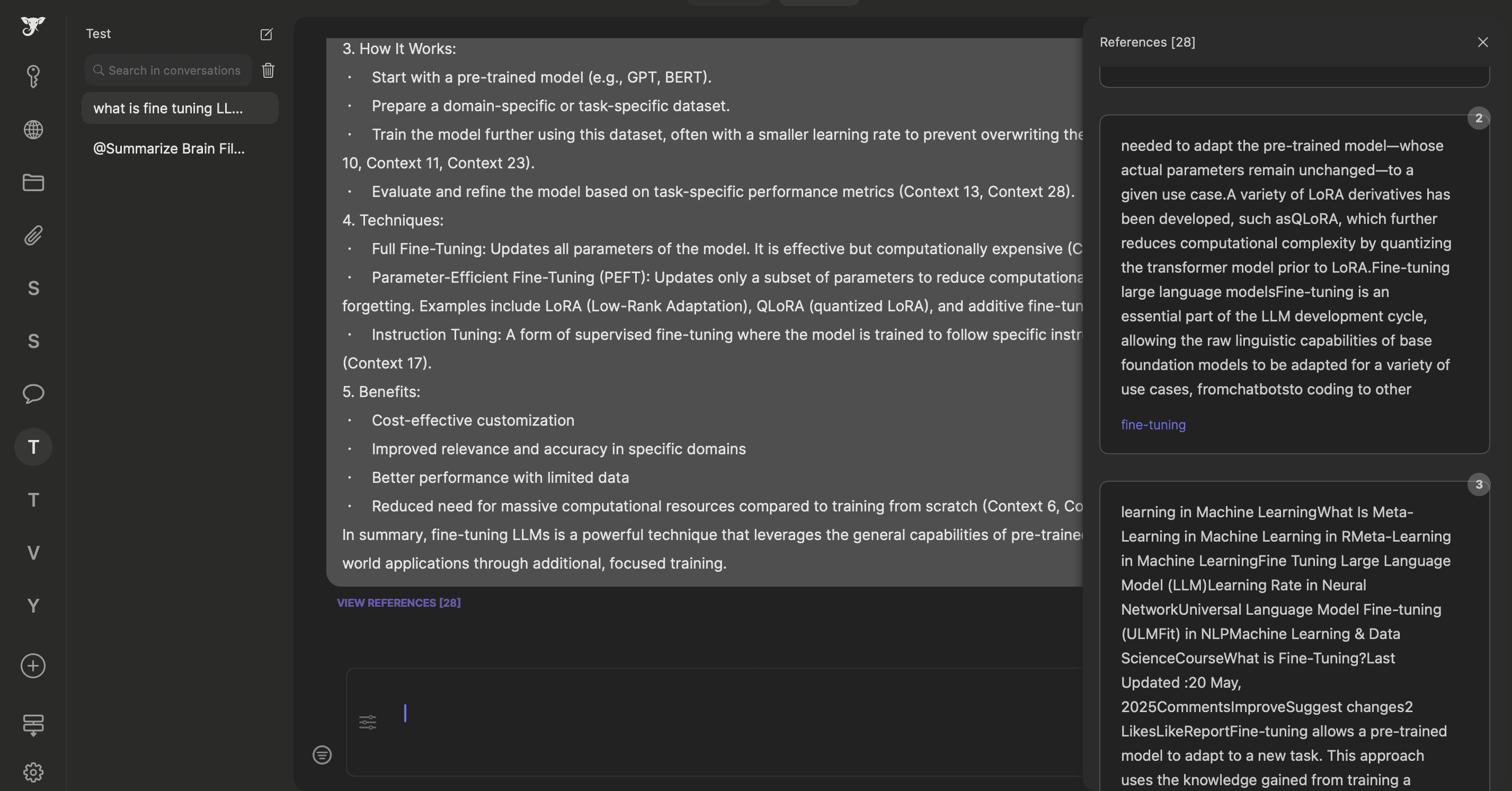
When you ask questions, Elephas provides organized answers that pull information from all relevant papers in your collection. The responses are structured for academic writing and include proper citations.
Response Features:
- Clear summaries of different viewpoints
- Lists of common themes and patterns
- Analysis of how studies relate to each other
- Identification of supporting and contradicting evidence
Follow-up Capabilities:
- Ask deeper questions about specific points
- Request more detail on particular themes
- Explore contradictions between studies
- Identify methodological similarities and differences
You can also request analysis of which papers support specific theories or challenge existing assumptions. This helps you understand debates and disagreements within your research field.
Step 5: Integrate into Your Research Workflow
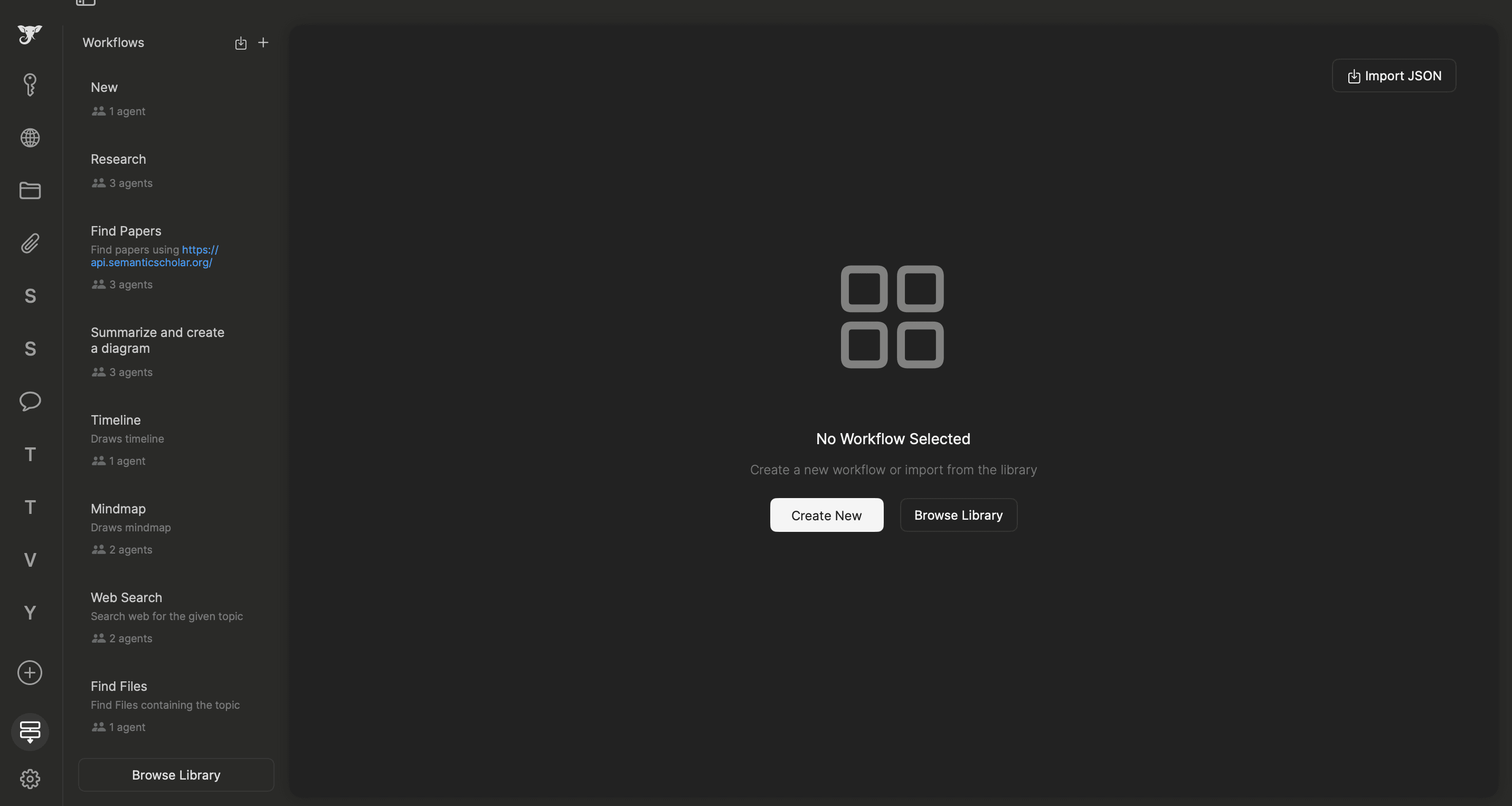
Make this AI-assisted approach part of your regular research process. Create a new Brain for each research project and add papers as you discover them. You can also automate searching the web using workflow automation.
If you are already using Elephas, click on the link below and add the code to the Elephas workflow automation tab by clicking on Import JSON in the top right corner.
In this web search automation workflow, if you give a topic, Elephas automatically searches the web and adds the best sources for that topic into Superbrain. You can also customize it however you want.
Workflow Integration:
- Create project-specific Brains for different research areas
- Add papers continuously as research progresses
- Use the system for course preparation and lecture planning
- Find unexpected connections between different research projects
Time Management Benefits:
- Literature reviews grow alongside your research
- No separate literature review phase at project end
- Continuous understanding of research landscape
- More time available for original research and writing
This approach allows you to spend saved time on original research, academic writing, and collaboration with other scholars.
Practical Application Example
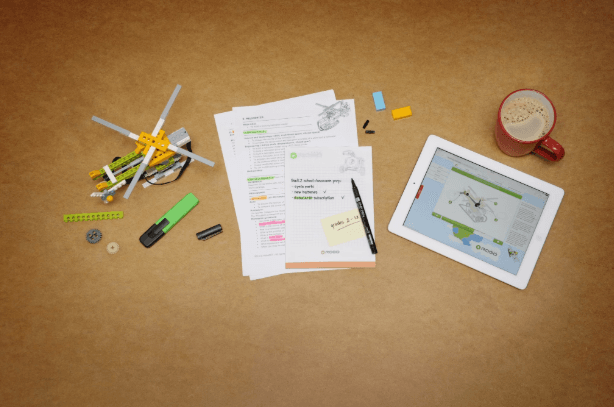
Consider research on social media's impact on political participation. You upload 30 relevant papers to your Elephas Brain. Within minutes, you can ask comprehensive questions about this topic.
Sample Analysis Process:
- Upload 30 papers about social media and political participation
- Ask: "What are the main ways social media affects voting behavior?"
- Receive comprehensive summary from all 30 papers
- Discover 15 papers focus on information sharing
- Find 10 papers examine social influence effects
- Identify 8 papers analyzing political engagement
Results Organization:
- Papers showing positive effects on political participation
- Studies finding negative impacts on democratic processes
- Research with mixed or inconclusive results
- Methodological approaches used across studies
When you need to add 10 more papers to your review, simply upload them and ask the same questions. The AI automatically includes new papers in its analysis and updates your understanding without requiring you to start over.
Key Benefits for Academic Researchers
Significant Time Savings:
- Reduce literature review time by 70-80%
- Complete in days what previously took weeks
- Focus on analysis instead of information organization
- More time available for original research contributions
Improved Research Quality:
- Identify patterns across dozens of papers simultaneously
- Spot connections that manual reading might miss
- Generate more thorough and insightful literature reviews
- Understand research landscape more comprehensively
Reduced Research Stress:
- Eliminate overwhelming stacks of unorganized papers
- Stop worrying about forgetting important details
- Make the research process feel manageable
- Maintain clear overview of complex research areas
Enhanced Academic Currency:
- Easily incorporate new papers into existing reviews
- Stay updated with latest research developments
- Quickly understand how new studies fit existing knowledge
- Maintain current understanding without starting from scratch
Getting Started with AI Literature Reviews

Begin using this approach immediately with Elephas. The Academic plan supports unlimited Brains, allowing you to organize different research projects separately.
Implementation Steps:
- Download Elephas from the official website
- Set up your first research Brain
- Upload a small collection of papers to test the system
- Practice asking different types of questions
- Gradually increase the number of papers in your collection
Most researchers experience immediate benefits on their first day. The biggest advantage comes when you realize you can focus on thinking about research instead of managing information.
Getting Started Benefits:
- Immediate improvement in research efficiency
- Quick learning curve for basic functions
- Scalable system that grows with your research needs
- Professional support for academic users
This shift from information management to actual analysis makes the difference between good and great research outcomes.
Advanced Tips for Research Optimization
Brain Organization Strategies:
- Create separate Brains for different research topics
- Organize papers by time periods or theoretical approaches
- Maintain focused collections for specific research questions
- Use multiple Brains for interdisciplinary research projects
Advanced Search Techniques:
- Use filter features to analyze specific paper subsets
- Focus searches on particular journals or publication years
- Compare findings across different time periods
- Analyze methodological approaches separately from findings
Output and Documentation:
- Export chat conversations to create literature review drafts
- Use AI responses as foundation for academic writing
- Maintain records of key insights and connections
- Create templates for future literature review projects
Think of Elephas as a research partner that has read all your papers and helps you understand their collective meaning. This partnership approach transforms how researchers work with academic literature and allocate their professional time.

Comments
Your comment has been submitted